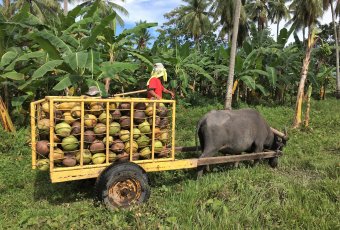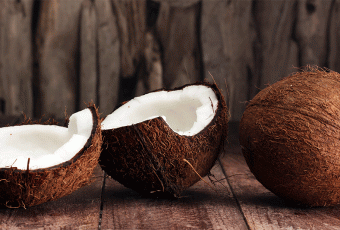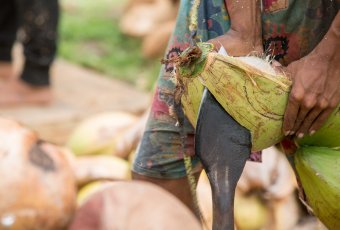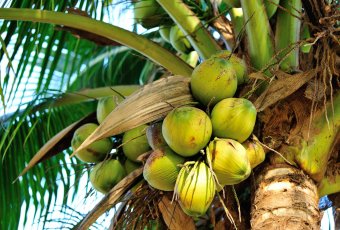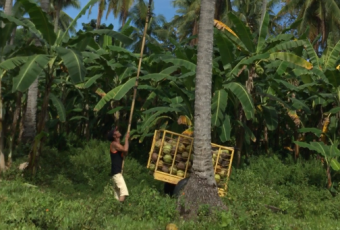The context
The coconut market is booming. The global coconut water segment, for example, increased by 150% in volume between 2013 and 2018. Yet, in the Philippines, the second coconut producer in the world, the supply chain is declining. Ageing Filipino coco farmers are the poorest in their country, with around 50% living with less than USD 2 per day. Some young farmers managed to set up new types of activities from coconuts and build themselves a brighter future. But a clear majority lack technical support, access to market and financing.
In Mindanao, coconut farmers are mostly aged between 40 to 60 years old, in a region where 70% of the population is under 35. Farmers have an average of 2 ha with around 200 trees. This planting density therefore leaves large spaces which are generally underutilized.
Although coconut accounts for 70% of the people’s income in the project zone, ageing farmers do not see it as a business but as a side activity. Farms are not adequately managed and, as a matter of fact, coconut yields in the Philippines are 2 to 3 times lower than in Brazil or in India. With no appropriate training, Filipino coconut farmers are not able to optimize their production to make a decent living and invest in coconut replanting, maintaining them in a poverty trap.
The project
How to improve coconut farmers’ livelihood and promote youth engagement in agriculture while providing industrial users with fully traceable coconuts?
To contribute to solving this equation, the Livelihoods Fund is investing in a 10-year project mobilizing stakeholders of the coconut value chain in Mindanao, Philippines’ second largest island: 5,000 motivated smallholder farmers; the Integrated Rural Development Foundation (IRDF), an experienced Filipino NGO; Franklin Baker, a leading manufacturer and exporter of coconut products; Mars, Inc a global business that produces some of the world’s most famous brands and which namely uses coconut for its Bounty® bars.
The social, environmental and economic impact
The Livelihoods-Coconut project will empower farmers with sustainable practices to better manage their farms and increase their yields. IRDF will train them on simple yet efficient practices to enhance productivity: trimming old leaves, cleaning crowns and around the bottom of the palm, composting… Alongside, around 30% of senile coconut trees per farm will be replaced by high-yielding ones. Each new tree will be able to produce around 100 nuts per year after only 3 to 4 years. As a starter pack, farmers will be provided with free seeds which will be germinated and matured in community nurseries created within the project.
To diversify farmers’ sources of income and make them more resilient to changes in the coconut market, the project will promote intercropping, i.e., growing different crops at the same time in the same space. Farmers will organize their plots as a multi-story system where space and sunlight will be fully optimized. Smaller trees like cocoa, coffee or banana will be planted in the shade of the coconut trees. Ground-level will be used for food and cash crops like sweet potatoes, vegetables, ginger or corn. Women will also be trained to manage the new crops and market them locally.
The project will focus on farmers’ working conditions during harvesting. They will be sensitized on safety measures and provided with security gear (harvesting sticks, sickles, helmets, harness and body-protection for dehusking).
In the end, better farm management combined to replanting and intercropping is expected to double farmers’ yields and transition around 10,000 ha to sustainable agriculture, with a positive impact on the soil’s fertility and its capacity to retain water and sequester CO2.
The project will implement a direct sourcing scheme: the 5,000 smallholders will sell their crop directly to Franklin Baker through farmer-owned cooperatives. The cooperatives will rely on networks of village-level farmers’ association to collect the coconut and bulk it through a unique collection point to Franklin Baker, which in turn will sell the processed coconut to Mars. In this way, Mars and Franklin Baker will have access to a fully transparent coconut supply chain up to farm level, in a cost-efficient manner. A transparent price mechanism will be defined to give more visibility to farmers and Franklin Baker and thus ensure the long-term stability of the supply chain. By selling their coconuts directly to Franklin Baker, farmers will retain a bigger share of the product’s market value.
Mars and Franklin Baker are committed to buying the coconut from this project for the next 10 years. This engagement is a key success factor for building trust between the farmers and the companies and gives the project enough time to generate lasting effects. Thanks to more productive coconut farms and their stable connection to Franklin Baker’s supply chain, farmers in the project will be able to double their revenues.
The project will also encourage young people and women to become social entrepreneurs, for example by setting-up small-scale transformation units of coco-coir and coco-peat (the coir’s dust) valorized from the currently unused coconut husks. Coir is a widely used renewable raw material for making twines, nets, mats for horticulture, protective covers for soils and slopes. The project will support the creation of at least three coco-coir processing units and will provide young people with suitable trainings. In this way, the project aims at empowering around 1,000 young people and women through small enterprises. Discussion on funding is also underway with local government bodies to raise these figures and enable transformation of additional agricultural products like coffee, cocoa or banana.
Young people will also be trained on agricultural techniques to become service providers for farmers: harvesting, maintenance of plots, management of nurseries. The objective is to give them the necessary skills and knowledge to also take over their family farm once their parents retire.



